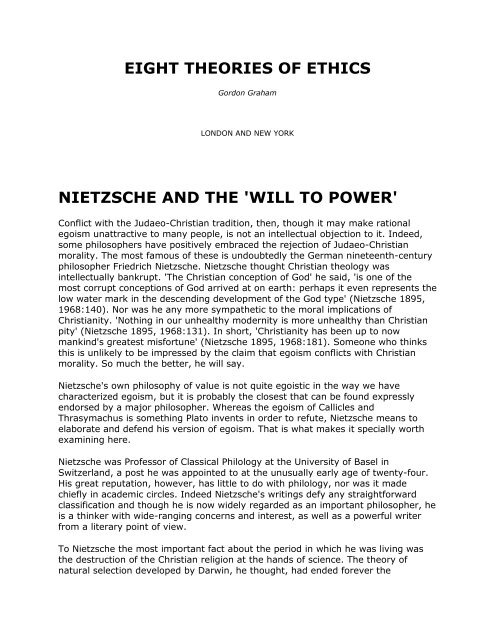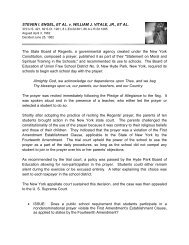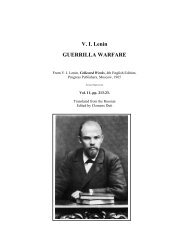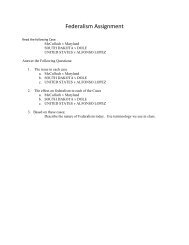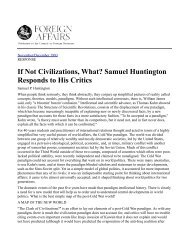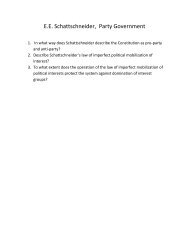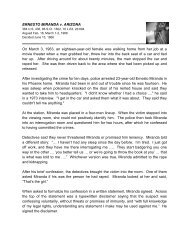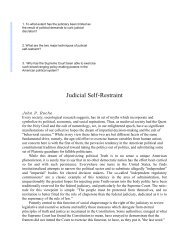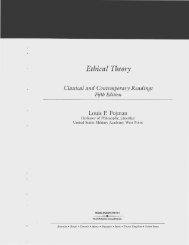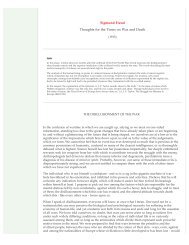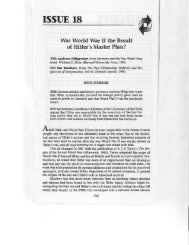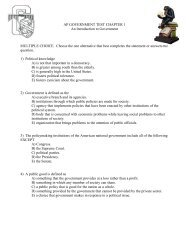eight theories of ethics nietzsche and the 'will to power' - jessbcuzz
eight theories of ethics nietzsche and the 'will to power' - jessbcuzz
eight theories of ethics nietzsche and the 'will to power' - jessbcuzz
Create successful ePaper yourself
Turn your PDF publications into a flip-book with our unique Google optimized e-Paper software.
EIGHT THEORIES OF ETHICS<br />
Gordon Graham<br />
LONDON AND NEW YORK<br />
NIETZSCHE AND THE 'WILL TO POWER'<br />
Conflict with <strong>the</strong> Judaeo-Christian tradition, <strong>the</strong>n, though it may make rational<br />
egoism unattractive <strong>to</strong> many people, is not an intellectual objection <strong>to</strong> it. Indeed,<br />
some philosophers have positively embraced <strong>the</strong> rejection <strong>of</strong> Judaeo-Christian<br />
morality. The most famous <strong>of</strong> <strong>the</strong>se is undoubtedly <strong>the</strong> German nineteenth-century<br />
philosopher Friedrich Nietzsche. Nietzsche thought Christian <strong>the</strong>ology was<br />
intellectually bankrupt. 'The Christian conception <strong>of</strong> God' he said, 'is one <strong>of</strong> <strong>the</strong><br />
most corrupt conceptions <strong>of</strong> God arrived at on earth: perhaps it even represents <strong>the</strong><br />
low water mark in <strong>the</strong> descending development <strong>of</strong> <strong>the</strong> God type' (Nietzsche 1895,<br />
1968:140). Nor was he any more sympa<strong>the</strong>tic <strong>to</strong> <strong>the</strong> moral implications <strong>of</strong><br />
Christianity. 'Nothing in our unhealthy modernity is more unhealthy than Christian<br />
pity' (Nietzsche 1895, 1968:131). In short, 'Christianity has been up <strong>to</strong> now<br />
mankind's greatest misfortune' (Nietzsche 1895, 1968:181). Someone who thinks<br />
this is unlikely <strong>to</strong> be impressed by <strong>the</strong> claim that egoism conflicts with Christian<br />
morality. So much <strong>the</strong> better, he will say.<br />
Nietzsche's own philosophy <strong>of</strong> value is not quite egoistic in <strong>the</strong> way we have<br />
characterized egoism, but it is probably <strong>the</strong> closest that can be found expressly<br />
endorsed by a major philosopher. Whereas <strong>the</strong> egoism <strong>of</strong> Callicles <strong>and</strong><br />
Thrasymachus is something Pla<strong>to</strong> invents in order <strong>to</strong> refute, Nietzsche means <strong>to</strong><br />
elaborate <strong>and</strong> defend his version <strong>of</strong> egoism. That is what makes it specially worth<br />
examining here.<br />
Nietzsche was Pr<strong>of</strong>essor <strong>of</strong> Classical Philology at <strong>the</strong> University <strong>of</strong> Basel in<br />
Switzerl<strong>and</strong>, a post he was appointed <strong>to</strong> at <strong>the</strong> unusually early age <strong>of</strong> twenty-four.<br />
His great reputation, however, has little <strong>to</strong> do with philology, nor was it made<br />
chiefly in academic circles. Indeed Nietzsche's writings defy any straightforward<br />
classification <strong>and</strong> though he is now widely regarded as an important philosopher, he<br />
is a thinker with wide-ranging concerns <strong>and</strong> interest, as well as a powerful writer<br />
from a literary point <strong>of</strong> view.<br />
To Nietzsche <strong>the</strong> most important fact about <strong>the</strong> period in which he was living was<br />
<strong>the</strong> destruction <strong>of</strong> <strong>the</strong> Christian religion at <strong>the</strong> h<strong>and</strong>s <strong>of</strong> science. The <strong>the</strong>ory <strong>of</strong><br />
natural selection developed by Darwin, he thought, had ended forever <strong>the</strong>
possibility <strong>of</strong> rational belief in God (though in places Nietzsche is very critical <strong>of</strong><br />
Darwinianism). It was Nietzsche who coined <strong>the</strong> celebrated slogan 'God is dead',<br />
<strong>and</strong> who claimed that ' "Pure spirit" is pure nonsense'. But he also held that most<br />
people had not registered <strong>the</strong> enormous significance <strong>of</strong> <strong>the</strong> collapse <strong>of</strong> religion, <strong>and</strong><br />
in a famous passage from one <strong>of</strong> his many books (The Gay Science) he imagines a<br />
scene in which <strong>the</strong> man who thinks that God is dead is regarded by his fellow<br />
citizens quite literally as a madman.<br />
If God <strong>and</strong> <strong>the</strong> supernatural in general have been irrevocably expelled from human<br />
thought, <strong>the</strong>n on Nietzsche's view, <strong>the</strong> whole foundation on which traditional values<br />
are built has been destroyed. Consequently everything having <strong>to</strong> do with values <strong>and</strong><br />
<strong>the</strong> meaning <strong>of</strong> human existence has <strong>to</strong> be thought out completely afresh. The title<br />
for a last great book that Nietzsche proposed but never managed <strong>to</strong> write was The<br />
Revaluation <strong>of</strong> All Values, <strong>the</strong> first part <strong>of</strong> it (which was completed) being called<br />
significantly 'The Anti-Christ'. It was this <strong>to</strong>tal restructuring <strong>of</strong> human thinking that<br />
Nietzsche saw as his special task, a task so enormous that some people suspected<br />
him <strong>of</strong> megalomania, a suspicion confirmed for <strong>the</strong>m by <strong>the</strong> fact that he did finally<br />
go insane <strong>and</strong> remained so for <strong>the</strong> last eleven years <strong>of</strong> his life. (The explanation <strong>of</strong><br />
his insanity is still uncertain, <strong>and</strong> some believe that it was more likely <strong>the</strong> result <strong>of</strong><br />
syphilis than <strong>of</strong> gr<strong>and</strong>iose ideas.)<br />
Now, however we regard Nietzsche's intellectual ambitions, <strong>the</strong> idea that traditional<br />
ways <strong>of</strong> thinking about good <strong>and</strong> bad are exhausted or outmoded is not so strange.<br />
Darwinian <strong>the</strong>ory (as well as some very important developments in his<strong>to</strong>rical<br />
scholarship) did present Christianity with serious intellectual challenges, <strong>and</strong><br />
whe<strong>the</strong>r for this or for some o<strong>the</strong>r reason, religious belief <strong>and</strong> practice in Western<br />
Europe did indeed undergo a major decline in <strong>the</strong> course <strong>of</strong> <strong>the</strong> twentieth century.<br />
Moreover, though <strong>the</strong> impact <strong>of</strong> this change is not always appreciated, <strong>the</strong> truth (if<br />
it is true) that <strong>the</strong> Judaeo-Christian basis for moral <strong>and</strong> ethical beliefs is no longer<br />
cogent or plausible, does leave contemporary society with many questions waiting<br />
for answers. Nietzsche's own writings, though very extensive, are not primarily an<br />
attempt <strong>to</strong> provide <strong>the</strong>se answers, <strong>and</strong> certainly <strong>the</strong>y do not do so in any sustained<br />
or systematic way. His chief purpose, ra<strong>the</strong>r, is <strong>to</strong> bring home <strong>to</strong> his readers <strong>the</strong><br />
importance <strong>and</strong> urgency <strong>of</strong> <strong>the</strong> philosophical questions with which he is concerned.<br />
Never<strong>the</strong>less, it is possible <strong>to</strong> construct an outline <strong>of</strong> <strong>the</strong> sort <strong>of</strong> answers that his<br />
approach implies. In doing so, three ideas are specially important. These are '<strong>the</strong><br />
will <strong>to</strong> <strong>power'</strong>, <strong>the</strong> Übermensch, <strong>and</strong> 'eternal recurrence'.<br />
Since <strong>the</strong> question <strong>of</strong> what human beings ought <strong>to</strong> aspire <strong>to</strong> could no longer be<br />
answered in traditional religious or moralistic terms, Nietzsche began his rethinking<br />
by asking what it is that does move people, <strong>and</strong> his answer was '<strong>the</strong> will <strong>to</strong> <strong>power'</strong>.<br />
What is good? -- All that h<strong>eight</strong>ens <strong>the</strong> feeling <strong>of</strong> power, <strong>the</strong> will <strong>to</strong> power, power<br />
itself in man.<br />
What is bad? -- All that proceeds from weakness.
What is happiness? The feeling that power increases -- that a resistance is<br />
overcome.<br />
Not contentment, but more power; not peace at all, but war; not virtue but<br />
pr<strong>of</strong>iciency.<br />
(Nietzsche 1895, 1968:127)<br />
It is this answer that makes his philosophy a variety <strong>of</strong> egoism. By '<strong>the</strong> will <strong>to</strong><br />
<strong>power'</strong> Nietzsche meant <strong>the</strong> desire <strong>to</strong> prevail in <strong>the</strong> circumstances <strong>of</strong> struggle that<br />
are an essential part <strong>of</strong> <strong>the</strong> human condition. (We can see <strong>the</strong> fur<strong>the</strong>r influence <strong>of</strong><br />
Darwin at work here <strong>and</strong> perhaps a precursor <strong>of</strong> Richard Dawkins' famous<br />
conception <strong>of</strong> '<strong>the</strong> selfish gene'.) The will <strong>to</strong> power is more than just <strong>the</strong> will <strong>to</strong> live;<br />
it is <strong>the</strong> will <strong>to</strong> dominate <strong>and</strong> overcome <strong>the</strong> competitive challenges <strong>of</strong> existence.<br />
This conception has been widely misunders<strong>to</strong>od both by supporters <strong>and</strong> detrac<strong>to</strong>rs,<br />
but it is easiest <strong>to</strong> see in what way it ought <strong>to</strong> be unders<strong>to</strong>od if we turn <strong>to</strong> <strong>the</strong><br />
second <strong>of</strong> his three leading ideas, <strong>the</strong> Übermensch.<br />
The German word Übermensch is literally translated 'overman', but usually<br />
rendered 'superman'. Nei<strong>the</strong>r translation is a happy one. The first means nothing in<br />
English. The second not only has comic book connotations but arouses ideas <strong>of</strong><br />
Frankensteinian attempts <strong>to</strong> engineer physically <strong>and</strong> intellectually superb human<br />
beings. It is partly this underst<strong>and</strong>ing <strong>of</strong> Übermensch that gave rise <strong>to</strong> an<br />
association between Nietzsche's ideas <strong>and</strong> <strong>the</strong> Nazis' adulation <strong>of</strong> <strong>the</strong> supposedly<br />
superior Aryan race. This is an association that is strongly resisted by Nietzsche's<br />
contemporary admirers <strong>and</strong> commenta<strong>to</strong>rs, who see it as something deliberately<br />
created by <strong>the</strong> forerunners <strong>of</strong> <strong>the</strong> Nazis. These included Nietzsche's own sister, who<br />
was responsible for publishing a posthumous collection <strong>of</strong> his diary entries under<br />
<strong>the</strong> title The Will <strong>to</strong> Power, a considerable part <strong>of</strong> which, <strong>the</strong>re is reason <strong>to</strong> think,<br />
Nietzsche himself rejected for publication. But <strong>the</strong> association has undoubtedly<br />
been assisted by Nietzsche's own intemperate language, especially in his last<br />
publications. The passage quoted above, for instance, is taken from one <strong>of</strong> <strong>the</strong>se,<br />
<strong>and</strong> continues 'The weak <strong>and</strong> ill-constituted shall perish: first principle <strong>of</strong> our<br />
philanthropy. And one shall help <strong>the</strong>m <strong>to</strong> do so' (Nietzsche 1895, 1968:127).<br />
In substance, however, Nietzsche's views have very little <strong>to</strong> do with Nazism. Indeed<br />
it is worth noting that Nietzsche is repeatedly on record as denouncing both anti-<br />
Semitism <strong>and</strong> German nationalistic fervour. Nietzsche's Übermensch is not <strong>the</strong> tall<br />
blond-haired Aryan dreamt <strong>of</strong> in Nazi mythology but <strong>the</strong> man in whom <strong>the</strong> will <strong>to</strong><br />
power is brought <strong>to</strong> perfection. (Nietzsche <strong>to</strong>ok a view <strong>of</strong> women that would not be<br />
popular <strong>to</strong>day.) Indeed, he compares most Germans unfavourably with <strong>the</strong> poet<br />
Goe<strong>the</strong>, 'not a German event but a European one', '<strong>the</strong> last German before whom I<br />
feel reverence', <strong>and</strong> for whom <strong>the</strong> ideal type was<br />
a strong, highly cultured human being, skilled in all physical accomplishments, who,<br />
keeping himself in check <strong>and</strong> having reverence for himself, dares <strong>to</strong> allow himself<br />
<strong>the</strong> whole compass <strong>and</strong> wealth <strong>of</strong> naturalness, who is strong enough for this<br />
freedom; a man <strong>of</strong> <strong>to</strong>lerance, not out <strong>of</strong> weakness, but out <strong>of</strong> strength, because he
knows how <strong>to</strong> employ <strong>to</strong> his advantage what would destroy an average nature; a<br />
man <strong>to</strong> whom nothing is forbidden, except it be a weakness, whe<strong>the</strong>r that<br />
weakness be called vice or virtue.<br />
(Nietzsche 1889, 1968:114)<br />
The Übermensch is someone completely self-contained as far as <strong>the</strong> value <strong>and</strong><br />
meaning <strong>of</strong> his life is concerned, someone who determines for himself what <strong>the</strong><br />
values <strong>of</strong> his life will be <strong>and</strong> who has self-mastery over his intellect <strong>and</strong> emotions<br />
sufficient <strong>to</strong> make those values a reality in his own life. Having ab<strong>and</strong>oned every<br />
inclination <strong>to</strong> look <strong>to</strong>wards <strong>the</strong> supernatural, such a person asserts his own will <strong>and</strong><br />
prevails against <strong>the</strong> pressure <strong>of</strong> conventional morality <strong>and</strong> unthinking conformity <strong>to</strong><br />
social norms -- 'a stronger species, a higher type, <strong>the</strong> conditions <strong>of</strong> whose genesis<br />
<strong>and</strong> survival are different from those <strong>of</strong> <strong>the</strong> average man … superman' (Nietzsche,<br />
2003, 177).<br />
In addition <strong>to</strong> Goe<strong>the</strong>, Nietzsche's own declared models <strong>of</strong> 'supermen' included<br />
Julius Caesar <strong>and</strong>, for a time, <strong>the</strong> composer Richard Wagner, with whom he was<br />
personally acquainted. Though in <strong>the</strong> end <strong>the</strong>y fell out, in many ways Wagner<br />
provides a good illustration <strong>of</strong> what Nietzsche had in mind when he talked <strong>of</strong><br />
Übermensch. Wagner was a composer <strong>of</strong> opera on a very gr<strong>and</strong> scale. His famous<br />
Ring cycle <strong>of</strong> operas was so large a conception that it was finally performed only<br />
when Wagner was able <strong>to</strong> construct a purpose-built <strong>the</strong>atre <strong>of</strong> his own at Bayreuth<br />
in sou<strong>the</strong>rn Germany. The idea <strong>of</strong> opera on this scale sprang from an equally large<br />
artistic ambition, namely <strong>to</strong> set Art on <strong>the</strong> right path by creating an art form, gr<strong>and</strong><br />
opera, in which all <strong>the</strong> fine arts -- <strong>the</strong> visual, <strong>the</strong> musical, <strong>and</strong> <strong>the</strong> dramatic -- would<br />
be united. In advancing this conception Wagner was breaking through <strong>the</strong><br />
conventional <strong>and</strong> practical limitations in <strong>the</strong> art world in which he worked. He was,<br />
in his own eyes at any rate, establishing his own artistic values.<br />
As an individual Wagner had an enormously dominant personality. He attracted <strong>to</strong><br />
himself many devoted disciples, <strong>and</strong> in <strong>the</strong> pursuit <strong>of</strong> his ambitions trampled over<br />
many o<strong>the</strong>rs. For a time Nietzsche was one <strong>of</strong> his most ardent followers, till,<br />
perhaps, he himself became a victim <strong>of</strong> Wagner's overbearing personality. But, he<br />
says,<br />
let us remain faithful <strong>to</strong> Wagner in what is true <strong>and</strong> original in him…. Let us leave <strong>to</strong><br />
him his intellectual tempers <strong>and</strong> cramps; let us, in all fairness, ask what strange<br />
kinds <strong>of</strong> nourishment <strong>and</strong> needs an art like his may require in order <strong>to</strong> be able <strong>to</strong><br />
live <strong>and</strong> grow! It doesn't matter that as a thinker he is so <strong>of</strong>ten wrong; justice <strong>and</strong><br />
patience are not for him. Enough that his life is justified before itself <strong>and</strong> remains<br />
justified -- this life which shouts at every one <strong>of</strong> us: 'Be a man <strong>and</strong> do not follow me<br />
-- but yourself! Yourself'.<br />
(Nietzsche 1887, 2001:98, emphasis original.<br />
The final sentence is a quotation from Goe<strong>the</strong>.)
In a moment we will look again at Nietzsche's attitude <strong>to</strong> Wagner for <strong>the</strong> light it<br />
throws on his thought about values. But first we must consider <strong>the</strong> third <strong>of</strong> his<br />
principal ideas -- eternal recurrence. Nietzsche was much struck by <strong>the</strong> thought<br />
that <strong>the</strong> matter in <strong>the</strong> universe is finite <strong>and</strong> <strong>the</strong> number <strong>of</strong> configurations it can<br />
assume is finite, while time is infinite. It follows that any configuration <strong>of</strong> matter<br />
will eventually recur <strong>and</strong>, since time is infinite, will recur again <strong>and</strong> again for all<br />
eternity. This is <strong>the</strong> belief in 'eternal recurrence'. If it is true that any configuration<br />
<strong>of</strong> matter will, given time, recur, it is true that we ourselves, being configurations <strong>of</strong><br />
matter in time, will recur again <strong>and</strong> again. The perception that this is so gives us a<br />
st<strong>and</strong>ard by which <strong>to</strong> judge <strong>the</strong> actions we perform <strong>and</strong> <strong>the</strong> characters we develop.<br />
We can ask not merely whe<strong>the</strong>r <strong>the</strong>y meet up <strong>to</strong> <strong>the</strong> st<strong>and</strong>ards <strong>of</strong> <strong>the</strong> day, but<br />
whe<strong>the</strong>r <strong>the</strong>y are fit for eternal recurrence. In this curious way, <strong>the</strong> Christian<br />
conception <strong>of</strong> life as a preparation for eternity makes a reappearance in <strong>the</strong> writings<br />
<strong>of</strong> <strong>the</strong> anti-Christian Nietzsche.<br />
This is a very brief summary <strong>of</strong> Nietzsche's voluminous writings <strong>and</strong> <strong>to</strong> set <strong>the</strong>m out<br />
in this simple way disguises <strong>the</strong> fact that a great deal <strong>of</strong> what he wrote was more<br />
poetry than philosophy, aphorism ra<strong>the</strong>r than argument, <strong>and</strong> that his books contain<br />
many conflicts <strong>and</strong> contradictions. Never<strong>the</strong>less enough has been said <strong>to</strong> allow us <strong>to</strong><br />
examine <strong>the</strong> fundamentals <strong>of</strong> his thought. Nietzsche saw supreme value in <strong>the</strong><br />
individual's <strong>'will</strong> <strong>to</strong> <strong>power'</strong>. The basis <strong>of</strong> this belief was his conviction that <strong>the</strong><br />
foundation <strong>of</strong> traditional values -- religion -- had been destroyed. In a sense<br />
nothing could replace it, but <strong>the</strong> Übermensch rises above this calamity by<br />
recognizing it, accepting it <strong>and</strong> creating value <strong>and</strong> meaning for himself through his<br />
own <strong>'will</strong> <strong>to</strong> <strong>power'</strong>. We will have <strong>to</strong> examine <strong>the</strong> idea <strong>of</strong> individual creation <strong>of</strong> value<br />
more closely when we come <strong>to</strong> <strong>the</strong> discussion <strong>of</strong> existentialist writers in Chapter 4.<br />
Here it is important <strong>to</strong> note that clearly what impressed Nietzsche was <strong>the</strong> idea <strong>of</strong> a<br />
solitary individual making sense <strong>of</strong> fundamental chaos <strong>and</strong> uncertainty by relying on<br />
nothing o<strong>the</strong>r than his own will <strong>and</strong> strength <strong>of</strong> purpose. It is for this reason that<br />
his thinking may be said <strong>to</strong> be egoistic.<br />
Yet it is never entirely clear just why <strong>the</strong> exercise <strong>of</strong> <strong>the</strong> will <strong>to</strong> power is <strong>to</strong> be<br />
valued. It thus remains unclear what mode <strong>of</strong> human existence best exemplifies it.<br />
Nietzsche speaks frequently <strong>of</strong> 'life' (usually italicised) <strong>and</strong> 'strength' <strong>and</strong> '<strong>power'</strong><br />
<strong>and</strong> his <strong>to</strong>ne implies that <strong>the</strong>se are what we might call heroic values. The trouble is<br />
that <strong>the</strong>y all appear <strong>to</strong> fall <strong>the</strong> wrong side <strong>of</strong> <strong>the</strong> distinction between instrumental<br />
<strong>and</strong> intrinsic value that was drawn in an earlier section <strong>of</strong> this chapter. They leave<br />
us asking '<strong>the</strong> value <strong>of</strong> life for what?', '<strong>the</strong> value <strong>of</strong> strength <strong>and</strong> power <strong>to</strong> do<br />
what?'. Some <strong>of</strong> <strong>the</strong> things he says suggest that Nietzsche would deny that '<strong>the</strong> will<br />
<strong>to</strong> <strong>power'</strong> is <strong>of</strong> purely instrumental value. It is <strong>the</strong> will <strong>to</strong> power for its own sake that<br />
is <strong>to</strong> be valued. But why should we value <strong>the</strong> will <strong>to</strong> power if it expresses itself in<br />
meanness or triviality? Nietzsche himself loa<strong>the</strong>d <strong>and</strong> despised many <strong>of</strong> <strong>the</strong><br />
attitudes <strong>of</strong> <strong>the</strong> Germans <strong>of</strong> his generation but nothing that he says reveals a logical<br />
barrier <strong>to</strong> <strong>the</strong>se despicable attitudes being <strong>the</strong>mselves expressions <strong>of</strong> <strong>the</strong> will <strong>to</strong><br />
power.<br />
To see <strong>the</strong> force <strong>of</strong> this point we should consider <strong>the</strong> case <strong>of</strong> Wagner once more.<br />
Nietzsche for a time admired Wagner enormously because <strong>of</strong> <strong>the</strong> great force <strong>of</strong> his
personality <strong>and</strong> his apparent disregard for those German values which Nietzsche<br />
thought small minded. But after some years he came <strong>to</strong> think that Wagner had<br />
succumbed <strong>to</strong> <strong>the</strong> parochial values he had earlier transcended. In short, he became<br />
a typical German <strong>of</strong> <strong>the</strong> sort Nietzsche greatly despised. Now <strong>the</strong>re is reason <strong>to</strong><br />
think that Nietzsche's view <strong>of</strong> Wagner was heavily influenced by personal fac<strong>to</strong>rs,<br />
but whatever <strong>the</strong> his<strong>to</strong>rical truth, it is easy <strong>to</strong> see that this change on Wagner's part<br />
does not in itself warrant a change <strong>of</strong> assessment from <strong>the</strong> Nietzschean point <strong>of</strong><br />
view. This is because, even if it is true that Wagner's work came <strong>to</strong> embody values<br />
he had hi<strong>the</strong>r<strong>to</strong> disregarded (German patriotic fervour expressed in mythology <strong>and</strong><br />
so on), it could still be true that he did this in <strong>the</strong> clear knowledge <strong>of</strong> <strong>the</strong> his<strong>to</strong>rical<br />
crisis <strong>of</strong> which Nietzsche made so much, <strong>and</strong> by virtue <strong>of</strong> his own will <strong>and</strong><br />
personality. In short, whatever values Wagner's work represented, or came <strong>to</strong><br />
represent, <strong>the</strong>y could be a result <strong>of</strong> 'life', an exercise <strong>of</strong> 'strength' <strong>and</strong> '<strong>the</strong> will <strong>to</strong><br />
<strong>power'</strong>. It is <strong>the</strong> heroic character <strong>of</strong> Wagner's personality <strong>and</strong> way <strong>of</strong> life that<br />
impressed Nietzsche, but <strong>the</strong> trouble is that <strong>the</strong> <strong>'will</strong> <strong>to</strong> <strong>power'</strong> need result in<br />
nothing heroic <strong>and</strong> can light upon those very things that Nietzsche loa<strong>the</strong>d. In o<strong>the</strong>r<br />
words, <strong>the</strong>re can be radically different but equally au<strong>the</strong>ntic responses <strong>to</strong> <strong>the</strong><br />
injunction from Goe<strong>the</strong> that Nietzsche quotes so approvingly -- 'Be yourself!'<br />
Of course, it might be said that this leaves out <strong>of</strong> <strong>the</strong> picture <strong>the</strong> idea <strong>of</strong> eternal<br />
recurrence. Not every expression <strong>of</strong> <strong>the</strong> will <strong>to</strong> power is fit for all eternity. Why not?<br />
Whatever <strong>the</strong> answer <strong>to</strong> this question, it must be found, not in references <strong>to</strong> <strong>the</strong> will<br />
<strong>to</strong> power, but <strong>to</strong> <strong>the</strong> sorts <strong>of</strong> thing that <strong>'will</strong>' results in. The idea <strong>of</strong> fitness for<br />
eternal recurrence seems intended <strong>to</strong> apply <strong>to</strong> people like Julius Caesar whose life<br />
st<strong>and</strong>s as an example <strong>of</strong> great generalship across <strong>the</strong> centuries, but it can as easily<br />
be applied <strong>to</strong> examples <strong>of</strong> great indolence or fraud. Nietzsche says that <strong>the</strong><br />
Übermensch is 'a man <strong>to</strong> whom nothing is forbidden, except it be a weakness'. But<br />
he himself wants <strong>to</strong> forbid some things -- endorsement <strong>of</strong> bourgeois German piety<br />
for instance. What he does not appear <strong>to</strong> see, however, is that <strong>the</strong>se things need<br />
not arise from weakness, but could be chosen as an exercise <strong>of</strong> 'life' <strong>and</strong> 'strength'.<br />
In short, Nietzsche's philosophy <strong>of</strong> value suffers from precisely <strong>the</strong> same fault as all<br />
forms <strong>of</strong> egoism. The rational egoist admires <strong>the</strong> exercise <strong>of</strong> individual will,<br />
especially when it goes against <strong>the</strong> flow <strong>of</strong> conventional moral opinion. But since<br />
<strong>the</strong> individual will can as readily be exercised in affirming conventional morality, his<br />
admiration is groundless <strong>and</strong> his preference for <strong>the</strong> unconventional groundless. This<br />
is because rational egoism can only give an account <strong>of</strong> instrumental value, yet<br />
requires some account <strong>of</strong> intrinsic value as well.<br />
By pursuing Nietzsche's philosophy this far, we have in fact returned <strong>to</strong> <strong>the</strong> dispute<br />
between Socrates <strong>and</strong> Callicles. In <strong>the</strong> Gorgias Socrates is able <strong>to</strong> refute Callicles by<br />
<strong>the</strong> use <strong>of</strong> counter-examples. He invites him <strong>to</strong> consider <strong>the</strong> case <strong>of</strong> sexual<br />
preda<strong>to</strong>rs on children, who get what <strong>the</strong>y want in opposition <strong>to</strong> conventional moral<br />
scruple, <strong>and</strong> invites Callicles <strong>to</strong> endorse <strong>the</strong>ir way <strong>of</strong> life. He cites <strong>the</strong> example <strong>of</strong> a<br />
bird that eats <strong>and</strong> excretes simultaneously as <strong>the</strong> perfect desire satisfaction<br />
machine, <strong>and</strong> asks if this is not an ideal exemplar <strong>of</strong> <strong>the</strong> sort <strong>of</strong> 'good life' Callicles<br />
is commending. Callicles angrily rejects <strong>the</strong>se counter-examples <strong>and</strong> declares that<br />
this is not at all <strong>the</strong> sort <strong>of</strong> thing he has in mind. But in doing so he is clearly<br />
inconsistent. The doctrine '<strong>the</strong> best life is <strong>the</strong> one in which you get what you want'
does not tell you what <strong>to</strong> want, <strong>and</strong> so it must rank <strong>the</strong> life <strong>of</strong> <strong>the</strong> drunkard whose<br />
desire is no greater than lying drunk among <strong>the</strong> garbage <strong>of</strong> <strong>the</strong> city along side that<br />
<strong>of</strong> a ruler, through whose strength <strong>of</strong> will <strong>and</strong> visionary purpose law <strong>and</strong> order are<br />
brought <strong>to</strong> a vast empire. Callicles is, <strong>of</strong> course, deeply reluctant <strong>to</strong> make this<br />
equivalence, <strong>and</strong> this is how Socrates forces him <strong>to</strong> ab<strong>and</strong>on <strong>the</strong> egoistic principle<br />
on which he had built his argument. But it is an equivalence that logic obliges him<br />
<strong>to</strong> make.<br />
In a similar fashion we have seen that anyone who views human will as central <strong>to</strong><br />
<strong>the</strong> creation <strong>of</strong> value in <strong>the</strong> way Nietzsche does, can be forced in<strong>to</strong> conceding that<br />
what matters is not just <strong>the</strong> assertion <strong>of</strong> will <strong>and</strong> desire but <strong>the</strong> assertion <strong>of</strong> heroic<br />
will <strong>and</strong> desire. This amounts <strong>to</strong> a concession that rational egoism -- we ought <strong>to</strong><br />
strive for what we want -- is an inadequate answer <strong>to</strong> <strong>the</strong> question <strong>of</strong> how we ought<br />
<strong>to</strong> live.<br />
It has <strong>to</strong> be acknowledged that <strong>the</strong> argument by counter-example that Socrates<br />
brings against Callicles is not <strong>and</strong> cannot be logically conclusive. Callicles could<br />
accept <strong>the</strong> requirements <strong>of</strong> consistency <strong>and</strong> accept that <strong>the</strong> life <strong>of</strong> <strong>the</strong> drunkard is<br />
as good as <strong>the</strong> life <strong>of</strong> <strong>the</strong> statesman, just as Nietzsche could accept that Wagner's<br />
endorsement <strong>of</strong> bourgeois German values was as much an exercise <strong>of</strong> <strong>the</strong> will <strong>to</strong><br />
power as his former rejection <strong>of</strong> <strong>the</strong>m was.<br />
But this sort <strong>of</strong> argument can be given a fur<strong>the</strong>r twist. Since what lies at <strong>the</strong> heart<br />
<strong>of</strong> rational egoism is <strong>the</strong> value <strong>of</strong> self-assertion, surely <strong>the</strong>re is at least one 'life<br />
style choice' that it cannot endorse, namely self-denial. If we hold, not only that<br />
people are so constituted <strong>the</strong>y will only do what <strong>the</strong>y want (psychological egoism)<br />
but also that one ought <strong>to</strong> strive for what one desires (rational egoism), <strong>the</strong>n we<br />
must regard those who do not follow <strong>the</strong>ir heart's desires as making a mistake <strong>of</strong><br />
some sort, <strong>and</strong> regard this is as a mistake whatever <strong>the</strong>ir state <strong>of</strong> mind. Thus, faced<br />
with <strong>the</strong> way <strong>of</strong> life chosen by Buddhist monks, for example, who make every effort<br />
<strong>to</strong> suppress <strong>and</strong> conquer <strong>the</strong>ir fleshly desires, <strong>and</strong> who (let us suppose) are so<br />
successful that <strong>the</strong>y come <strong>to</strong> be without anything we commonly call desires, <strong>the</strong><br />
proponents <strong>of</strong> rational egoism are bound <strong>to</strong> say that <strong>the</strong> monks' life is, objectively<br />
speaking, less good than ano<strong>the</strong>r, more self-centred human life. Their mot<strong>to</strong> is <strong>the</strong><br />
exact opposite <strong>of</strong> 'Be yourself'; it is 'Deny yourself', a mot<strong>to</strong> that can also be said <strong>to</strong><br />
characterize <strong>the</strong> Christianity Nietzsche so despises.<br />
This implication -- that <strong>the</strong> life <strong>of</strong> self-denial is less good than <strong>the</strong> life <strong>of</strong> selfassertion<br />
-- follows from <strong>the</strong> fact that ethical egoism is a doctrine. It recommends<br />
<strong>the</strong> pursuit <strong>of</strong> personal desires <strong>and</strong> must <strong>the</strong>refore rule out <strong>the</strong>ir renunciation, even<br />
if those who deny <strong>the</strong>mselves come <strong>to</strong> like <strong>the</strong> life <strong>the</strong>y lead. 'Buddhism', Nietzsche<br />
remarks, 'is a religion for <strong>the</strong> fatigue <strong>and</strong> end <strong>of</strong> a civilization' (Nietzsche 1895,<br />
1968:144). It might be replied that Buddhist monks are not a proper counterexample<br />
<strong>to</strong> <strong>the</strong> egoistic ideal because though <strong>the</strong>y alter <strong>the</strong>ir desires, <strong>the</strong>y still end<br />
up doing what <strong>the</strong>y want <strong>to</strong> do. To reply in this way, however, provides only a<br />
temporary respite. A Buddhist monk might say: My question is, What should I<br />
want, if I am <strong>to</strong> find <strong>the</strong> path <strong>to</strong> peace <strong>and</strong> happiness? It is dogmatism for egoists<br />
<strong>to</strong> argue that getting whatever I want must make me happy. Many people have
hurtful or even self-destructive desires (drug addicts for instance). But if getting<br />
what I happen <strong>to</strong> want, or even what I desperately want, does not necessarily lead<br />
<strong>to</strong> happiness, why should I adopt <strong>the</strong> egoistic principle as <strong>the</strong> basis <strong>of</strong> my life <strong>and</strong><br />
conduct? At <strong>the</strong> very least I need <strong>to</strong> be <strong>to</strong>ld what wants are good for me.


